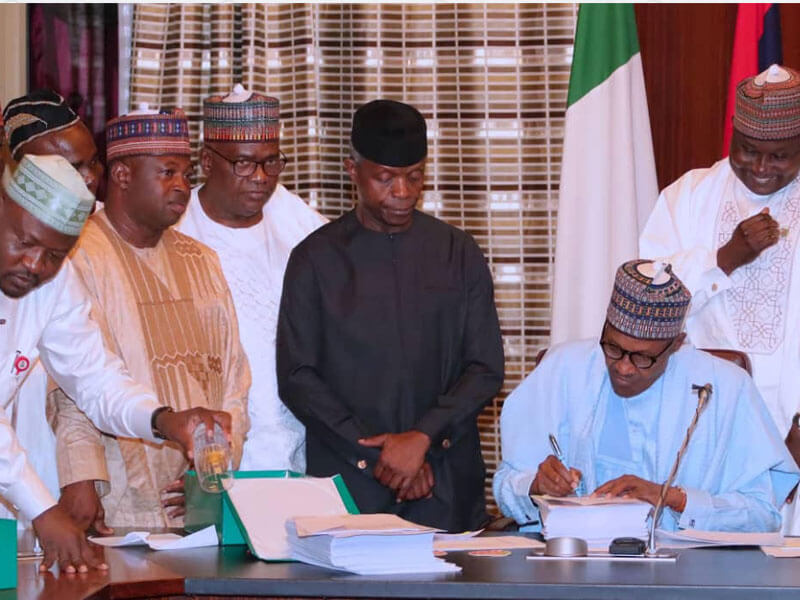- 2018 Budget Deficit May Rise to N4.4tn — Report
Except the Federal Government adopts a pragmatic approach to shore up its independent revenue, the fiscal deficit in the 2018 budget may widen from the appropriated sum of N1.9tn to N4.4tn, an economic report prepared by Afrinvest West Africa has revealed.
The company in its ‘Nigerian Banking Sector Report’, which was launched on Monday in Abuja, predicted a revenue underperformance of 40 per cent in independent revenue of the government.
It said that as a result of political distractions caused by election campaigns, the fiscal deficit might widen to up to 3.5 per cent of nominal Gross Domestic Product.
This, it added, was above the three per cent threshold prescribed by the Fiscal Responsibility Act.
The 2018 budget, which was signed by President Muhammadu Buhari, had a total spending of N9.1tn made up of N2.87tn for capital expenditure; N3.51tn for recurrent (non-debt) expenditure; while N2.01tn was projected to be spent on debt servicing.
The N9.1tn budget was to be financed from N2.99tn to be generated from oil revenue; N31.25bn from Nigeria Liquefied Natural Gas dividend; while N1.17bn was expected to be realised from minerals and mining revenue.
The Federal Government also projected to generate N658.55bn from Companies Income Tax; N207.51bn from Value Added Tax; N324.86bn from the Nigeria Customs Service; while N57.87bn was expected to come from Federation Account levies.
In the same vein, the government expected N847.95bn as independent revenue from its agencies, while tax amnesty income, signature bonus and unspent balance from previous years were to provide N87.84bn, N114.3bn and N250bn, respectively.
In the report, Afrinvest expressed worry that the “Federal Government’s ambitious spending plans contrasts poorly with revenue realities.”
For instance, the report explained that while the assumption for oil revenue was achievable, that of independent revenue and recoveries remained a source for concern.
The report read in part, “The Federal Government plans to generate 41.6 per cent of its revenues from oil and the remainder from taxes, independent revenue and recoveries, which account for 40.5 per cent of total projected revenues and have historically underperformed.
“Given these considerations as well as political distractions, we estimate a significant underperformance in revenues by 40 per cent.
“Hence, we estimate the fiscal deficit to expand to N4.4tn above budget estimate of N1.9tn, representing 3.5 per cent of nominal Gross Domestic Product, well above the three per cent threshold prescribed by the Fiscal Responsibility Act.”
Speaking on the report, the Managing Director, Afrinvest West Africa, Mr Ike Chioke, said the report focussed on seven critical areas of the economy.
The areas are oil and gas sector, power sector reform, boosting competitiveness, transportation and infrastructure, human capital development, security, and building democratic institutions.

 Billionaire Watch3 weeks ago
Billionaire Watch3 weeks ago
 Startups4 weeks ago
Startups4 weeks ago
 News4 weeks ago
News4 weeks ago
 News4 weeks ago
News4 weeks ago
 Bitcoin4 weeks ago
Bitcoin4 weeks ago
 Naira4 weeks ago
Naira4 weeks ago
 Forex3 weeks ago
Forex3 weeks ago
 Treasury Bills4 weeks ago
Treasury Bills4 weeks ago

























